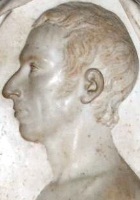Charles Wolfe
Charles Wolfe Poems
Not a drum was heard, nor a funeral note,
As his corse to the rampart we hurried;
Not a soldier discharged his farewell shot
O'er the grave where our hero we buried.
...
That strain again? It seems to tell
Of something like a joy departed;
I love its mourning accents well,
Like voice of one, ah! broken-hearted.
...
Oh say not that my heart is cold
To aught that once could warm it -
That Nature's Form so dear of old
No more has power to charm it;
...
Charles Wolfe Biography
Charles Wolfe was an Irish poet, chiefly remembered for his "exquisite elegy", The Burial of Sir John Moore after Corunna Family Born at Blackhall, County Kildare, the youngest son of Theobald Wolfe of Blackhall - grandson of Richard Wolfe of Forenaughts House in the same county - and his wife Frances, daughter of Rev. Peter Lombard. Charles Wolfe's grandfather was a first cousin of Arthur Wolfe, 1st Viscount Kilwarden and the godfather, but widely believed to be the natural father, of Theobald Wolfe Tone. Education Not long after he was born, his father died and the family moved to England. In 1801, Wolfe was sent to a school in Bath but was sent home a few months later due to his ill health. From 1802 to 1805, he was tutored by a Dr Evans in Salisbury before being sent to Winchester College. He seems to have been exceedingly popular both at school and within his own family. In 1808, his family returned to Ireland, and the following year he was entered into Trinity College, Dublin, graduating in 1814. He had turned down the chance to read for a scholarship as he was in love with a girl and could not commit to celibacy as was then required. Career He was ordained as a Church of Ireland priest in 1817, first taking the Curacy of Ballyclog in Co. Tyrone before transferring almost immediately to Donaghmore, County Tyrone. There he developed a close friendship and deep respect for the Rev. Thomas Meredith, Rector of nearby Ardtrea, Co. Tyrone, and a former Fellow of Trinity College Dublin. Wolfe wrote two epitaphs for Meredith, one on his memorial in the parish church of Ardtrea, and another intended for his tomb, which can both be read within Meredith's entry. Charles Wolfe is best remembered for his poem, The Burial of Sir John Moore after Corunna, written in 1816 and much collected in 19th and 20th century anthologies. The poem first appeared in the Newry Telegraph, April 19, 1817, and was re-printed in many other periodicals. But it was forgotten until after his death when Lord Byron drew the attention of the public to it. Wolfe's only volume of verse, Poetical Remains appeared in 1825 with The Burial of Sir John Moore and fourteen other verses of an equally high standard. Death Wolfe remained at Donoughmore until 1820, but, rejected by the woman for whom he gave up his academic career, and with his only real friend in Co. Tyrone now dead, he moved to Cobh, where he remained until his death three years later from consumption , caught from a cow at the age of 31. He is buried in Cobh at the cemetery known locally as Old Church Cemetery, but properly Clonmel Cemetery. There is also a plaque to his memory in the church at Castlecaulfield, the village where he lived whilst Curate at Donaghmore, as well as a marble monument to him at St. Patrick's Cathedral, Dublin.)
The Best Poem Of Charles Wolfe
The Burial Of Sir John Moore At Corunna
Not a drum was heard, nor a funeral note,
As his corse to the rampart we hurried;
Not a soldier discharged his farewell shot
O'er the grave where our hero we buried.
We buried him darkly at dead of night,
The sods with our bayonets turning;
By the struggling moonbeam's misty light
And the lantern dimly burning.
No useless coffin enclosed his breast,
Nor in sheet nor in shroud we wound him;
But he lay like a warrior taking his rest
With his martial cloak around him.
Few and short were the prayers we said,
And we spoke not a word of sorrow;
But we steadfastly gazed on the face that was dead,
And we bitterly thought of the morrow.
We thought, as we hollowed his narrow bed
And smoothed down his lonely pillow,
That the foe and the stranger would tread o'er his head,
And we far away on the billow!
Lightly they'll talk of the spirit that's gone
And o'er his cold ashes upbraid him,--
But little he'll reck, if they let him sleep on
In the grave where a Briton has laid him.
But half of our heavy task was done
When the clock struck the hour for retiring:
And we heard the distant and random gun
That the foe was sullenly firing.
Slowly and sadly we laid him down,
From the field of his fame fresh and gory;
We carved not a line, and we raised not a stone,
But left him alone with his glory.

His poem " The Burial of Sir John Moore at Corruna" is also in Gallego (the language of Galicia) on the wall of the Jardin de San Carlos where Sir John Moore is Buried.